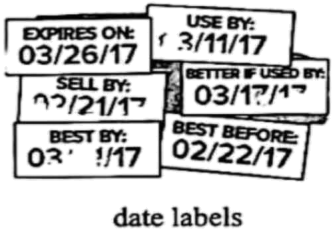Before ending up on a supermarket shelf, an avocado (牛油果) has produced 1. 3 kilograms of carbon into the atmosphere. Its production alone uses 60 gallons of water. Despite this, the fruit will often be thrown away as household waste.
Household food waste is the result of mismanagement. If the food is better managed much of the waste is avoidable. To reduce household food waste, a growing number of food sellers decide to remove date labeling, such as the "use by" or "best before" date, from some fresh food.

Past studies have confirmed the importance of date labelling. Almost 60% of western European consumers surveyed said they "always" check date labels while purchasing. But date labelling can cause problems. People's failure to truly understand date labellling often leads to unreasonable decision making. Indeed, consumers commonly don't accept eatable, but date-expired (过期的) food.
To get rid of date labelling is therefore a promising start. Without date labels, information that may affect consumers' understanding of what is safe to eat is removed. Instead, consumers are encouraged to sense check fresh food items.
In the case of an avocado, the advice given to consumers is that when ripe (成熟的) it should have a "pleasant and slightly sweet smell" while the skin should be "dark green or brown".
Information is also provided on how an avocado should look, taste, and feel when "overripe". It is hoped that a better informed consumer will be less likely to blindly throw away food due to an expiration date.
